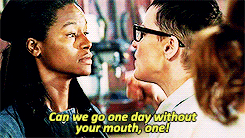Miss(Cis) Expectations: Pregnancy & Trans Identities

Posted by Aleo Pugh
September 2, 2016
It’s the first week of classes and I’ve already had to defend my decision not to carry children twice.

It happens at least once every year, either from friends, family or well-meaning acquaintances, my insistence that I will never carry is met with disturbed, pity-filled consolations – pity because some assume I am infertile or believe my queerness has jaded my perceptions of pregnancy, and shameful disbelief that I fail to follow my “maternal instincts.” This pity typically morphs into anger or twenty-minute tirades filled with alternative options, as if I have never watched a Laci Green video, or as if my decision is not well-informed and just came overnight. These interactions demonstrate concern at best from commentators, but for me, they demonstrate disrespect towards my identity and autonomy.
My first memory of having my opinions on pregnancy, and as a result, my body policed, was when I was about eight-years-old. Whenever I feel obliged to defend my decision, I can distinctly remember sitting on the black, leather loveseat where I was braiding my dolls hair, attempting to mirror my mother’s quick moving hands as she braided one of her client’s hair. Their conversations were always engaging; typical salon talk; exchanging stories about their children and husband, but on this particular day, the conversation shifted towards me. My mom talked with her client in detail about my future as if I wasn’t present; about my future husband and the children that would inevitably follow. If eight-year-old me had the language to talk about heteronormativity and patriarchy, I would have read her for filth, but instead, I sat there in extreme discomfort and continued sloppily braiding. I can still remember my distraught response, disgusted at the prospect of ever marrying a man or having children and angry at my mom for assuming I would.
They both laughed, brushing my response off as naïve child talk that would eventually wear off with age (and hormones), but my decision still stands till this day, and now I enjoy the satisfaction of the laugh they shared that day. I will never marry a man, and I will never experience pregnancy.
As an 18-year-old non-binary/transgender queer person, I am now likely infertile after beginning hormone replacement therapy (hrt) as a part of my medical transition, and I feel incredibly comfortable with my decision. As I have grown more comfortable with myself and re-imagined my life and decisions in ways that validate rather than undermine my identity, the prospect of infertility feels really good to me. Of course, my conviction to not carry prior to possibly being infertile still contains the same authority. But, knowing that the possibility of pregnancy is slim to none is really affirming.
While some transgender/gender non-conforming people who were assigned female at birth (afab) do not experience a discordance between their genitalia and gender(s), for me, thinking about and being reminded of my reproductive organs is invalidating. Some days, periods remind me of my reproductive organs, and hearing terms associated with them, then experiencing periods, can make it difficult for me to function; other days it can be something as simple as seeing a diagram of reproductive organs in class or in passing. In my specific experience being trans, these conversations are already really dysphoria-inducing and triggering when I’m not a subject of the conversation, so having debates about my reproductive organs amplifies my discomfort. It serves as a reminder that, regardless of my autonomous decision to not have children, it is still theoretically a possibility, one that I am constantly reminded of and constantly battling. It communicates to me that although I have clarified what matters to me, that there are other people who believe they can assess and understand my reality better than I can. It invalidates my autonomy and my ability to decide what is best for my physical, mental, emotional, and spiritual well-being.
While some trans folks seeking medical treatment that could potentially render them infertile really wrestle with the either-or nature of transition– either being able to affirm their genders through hormones and/or surgeries OR the desire to have children– I knew that I didn’t want to carry since I was young. Recognizing that I am trans has helped to contextualize some of my discomfort with the idea of pregnancy, but it does not constitute all of my reasoning.
When having conversations about reproductive justice, it’s important to note that reproductive justice is as much about the ability to choose what happens after one becomes pregnant as the ability to choose to never become pregnant. According to the U.S Census Bureau’s Current Population Survey, as of 2014, 47.6 percent of women between age 15 and 44 had never had children, effectively the highest percentage since 1976. Nearly half the population of folks who are able to carry children aren’t having any children. However, societal expectations frequently shame and demonize people who make the choice not to carry.
Empowerment for all people should not rely solely on providing them with resources to do decide what to do with their pregnancies, but to make sure the decision to not have children is a viable option as well. While some bodies theoretically have the ability to carry children, it’s not a practical option for all, and this decision should be respected.
Leave a Reply
You must be logged in to post a comment.

